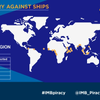U.S. fines Italian shipping company $2.75m for falsifying oil records
Carbofin S.p.A., an Italian domiciled company that owned and operated the M/T Marigola was sentenced to pay an overall criminal penalty of $2.75 million for knowingly falsifying the vessel’s oil record book in violation of the Act to Prevent Pollution from Ships (APPS), announced the Department of Justice Environment and Natural Resources Division and the U.S. Attorney’s Office for the Middle District of Florida.
During 2013 and 2014, on numerous international voyages, senior members of the crew of the M/T Marigola directed the installation and use of a so-called “magic hose” to dispose of sludge, waste oil and oil-contaminated bilge water directly into the sea bypassing required pollution prevention equipment. On April 16, 2014, the vessel called upon the Port of Tampa to load anhydrous ammonia. Coast Guard inspectors boarded the vessel and were approached by two junior engineering crew members who showed the inspectors a video of the “magic pipe” hooked up between piping leading to the bilge tank and the vessel’s boiler blow down valve. The boiler blow down valve is a discharge point for the boiler to release hot water and steam. The inspectors had the valve removed and an oily black substance was discovered. Oil samples taken from the “magic hose,” the bilge piping and the boiler blow down valve matched. The Chief Engineer, Carmelo Giano, and the Second Engineer, Alessandro Messore, had previously pleaded guilty and were sentenced for their role in ordering the use of the “magic hose” to illegally discharge oily waste into the sea.
The sentence was given by the Honorable Virginia M. Hernandez Covington. Out of the $2.75 million criminal penalty, $600,000 will be paid to the National Marine Sanctuary Foundation for the benefit of Florida’s only national marine sanctuary: the Florida Keys National Marine Sanctuary. The funds are to be used to support the protection and preservation of natural resources located in and adjacent to the sanctuary, including the cleanup and remediation of pollution in the sanctuary; restoration of injured resources, particularly coral reefs and seagrass beds and species dependent on those habitats. The funds will also support scientific research in, and public education about, the Florida Keys National Marine Sanctuary.
“We are extremely grateful to the U.S. Department of Justice in supporting the work of the National Marine Sanctuary Foundation on behalf of the nation's marine sanctuaries, including here at the Florida Keys National Marine Sanctuary,” said President and CEO Jason Patlis of the National Marine Sanctuary Foundation. “These funds will go to critical education, research and restoration activities, including deployment of mooring buoys, coral reef restoration and study and mitigation of invasive species impacts.”
“Marine environmental protection is one of the Coast Guard's primary missions,” said Captain Gregory Case of the Port at Sector St. Petersburg. “The Coast Guard takes marine pollution seriously and works cohesively with our partner agencies to hold those who violate international law accountable for their actions. We anticipate the results of this case will deter future illegal oil discharges into the sea.”
Consistent with requirements in the APPS regulations, a vessel like the M/T Marigola, must maintain a record known as an oil record book in which transfer and disposal of all oil-contaminated waste and the discharge overboard and disposal otherwise of such waste, must be fully and accurately recorded by the person or persons in charge of the operations. Oil-contaminated bilge waste can be discharged overboard if it is processed through on-board pollution prevention equipment known as the oily water separator (OWS). Waste oil and sludge can only be disposed of using an on-board incinerator or by discharging the waste to a shore-side facility, barge or tanker truck. Giano and Messore falsified the oil record book by not recording that oily waste was being disposed of through the boiler blow down valve.
During the course of the investigation, it was revealed that the oil record book for the M/T Marigola was falsified since at least June 16, 2013. The investigation also revealed that illegal oily waste discharges had occurred from two other vessels owned and operated by Carbofin, the M/T’s Marola and Solaro. On the M/T Marola, a “magic hose” was used between on or about December 2012 and April 2013 and on the M/T Solaro between on or about February to August 2013.
The case was investigated by U.S. Coast Guard Sector St. Petersburg and the U.S. Coast Guard Investigative Service. The case was prosecuted by Kenneth E. Nelson of the Environmental Crimes Section of the Department of Justice and Matthew Mueller of the U.S. Attorney’s Office of the Middle District of Florida.
justice.gov













